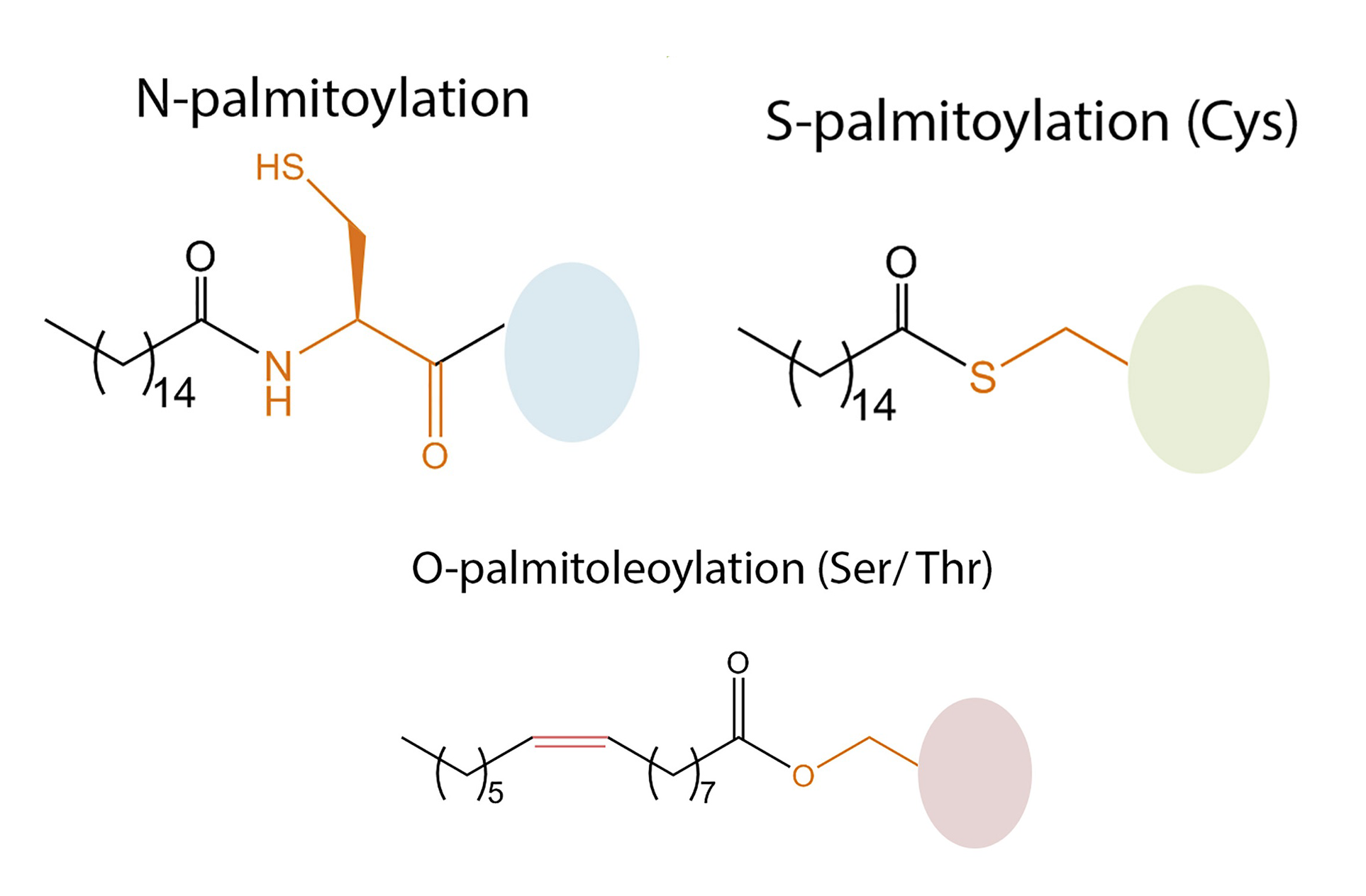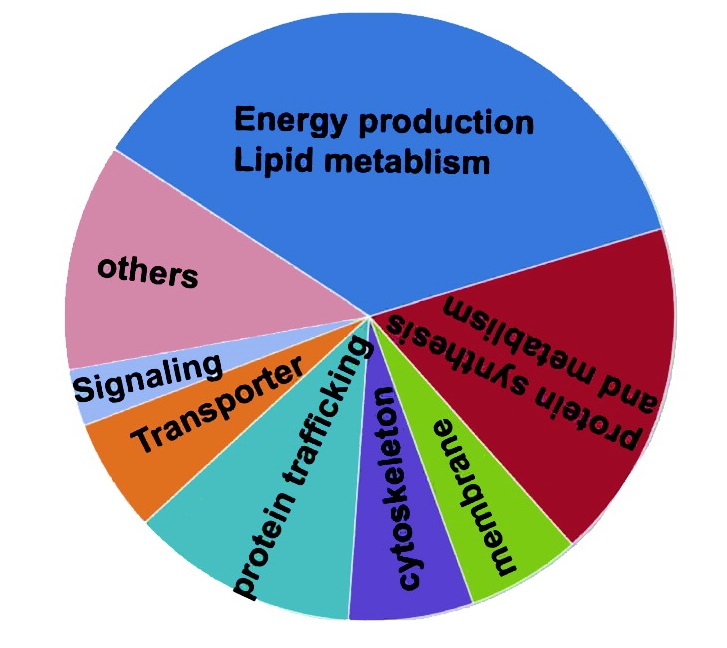Palmitoylation Proteomics Analysis Service
Palmitoylation proteomics analysis is a high-throughput analytical technique specifically designed to study protein palmitoylation. Palmitoylation is a reversible lipid post-translational modification (PTM) in which long-chain fatty acids, such as palmitic acid, covalently attach to cysteine residues on proteins. This modification affects protein stability, subcellular localization, protein-protein interactions, and signal transduction. The technique primarily relies on high-resolution liquid chromatography-mass spectrometry (LC-MS/MS), combined with metabolic labeling, click chemistry, or specific enrichment strategies, enabling precise identification and quantification of palmitoylation sites.
Palmitoylation proteomics analysis service is widely applied in cancer research, biological signal transduction, neurodegenerative diseases, immune regulation, and infectious diseases. For example, in neuroscience research, palmitoylation regulates synaptic plasticity and neurotransmitter receptor function, playing a crucial role in diseases such as Alzheimer’s and Parkinson’s. In cancer research, palmitoylation influences the activation of oncogenic signaling pathways, making it a potential therapeutic target. This service provides robust support for uncovering the biological functions of palmitoylation, elucidating disease mechanisms, and identifying drug targets.

Gao, X X. et al. Cell Chemical Biology, 2018.
Figure 1. Types of Cellular Protein Palmitoylation.
Services at MtoZ Biolabs
Leveraging a high-resolution liquid chromatography-mass spectrometry (LC-MS/MS) platform combined with specific enrichment techniques and metabolic labeling methods, the palmitoylation proteomics analysis service provided by MtoZ Biolabs enables precise identification and quantification of protein palmitoylation modifications. This service includes sample preparation, enrichment of palmitoylated peptides, high-throughput mass spectrometry detection, and bioinformatics analysis, ensuring high sensitivity and high-resolution data acquisition. Simply provide us with your experimental objectives and sample materials, and we will manage the entire workflow, delivering detailed identification and quantification of palmitoylation modifications on specific proteins and a panoramic view of palmitoylation modifications across various samples, uncovering extensive palmitoylation patterns.
Analysis Workflow
1. Sample Preparation
Total protein is extracted from cell, tissue, or biofluid samples and enzymatically digested to ensure the generation of high-quality peptides for subsequent analysis.
2. Specific Enrichment
Metabolic labeling, click chemistry, or affinity purification strategies are employed to selectively enrich palmitoylated peptides, enhancing detection sensitivity and specificity.
3. Mass Spectrometry Analysis
High-resolution liquid chromatography-mass spectrometry (LC-MS/MS) is used for high-throughput identification and quantitative analysis of enriched palmitoylation-modified peptides.
4. Bioinformatics Analysis
Professional data analysis software is used to identify modification sites, perform quantitative assessments, and conduct pathway enrichment analysis to explore the biological functions of palmitoylation.
5. Results Reporting and Interpretation
A comprehensive data report is provided, including modification site information, changes in modification levels, and potential functional annotations, offering in-depth research support and experimental validation recommendations for clients.

Figure 2. The Workflow of Palmitoylation Proteomics.
Service Advantages
1. Advance Analysis Platform
MtoZ Biolabs established an advanced palmitoylation proteomics analysis service platform, guaranteeing reliable, fast, and highly accurate analysis service.
2. One-Time-Charge
Our pricing is transparent, no hidden fees or additional costs.
3. Multilevel Quantitative Analysis
Comprehensive quantification is provided at both the total protein level and the modification level, revealing the dynamic changes in palmitoylation under different physiological and pathological conditions.
4. In-Depth Data Analysis
Utilizing advanced bioinformatics tools, this service offers modification site identification, pathway enrichment, and protein network analysis to elucidate the biological functions and regulatory mechanisms of palmitoylation.
5. Customized Experimental Solutions
Tailored experimental designs and personalized data analysis are available based on client requirements. MtoZ Biolabs provides flexible solutions to support disease research, drug target discovery, and the development of novel therapeutic strategies.
Applications
1. Cancer Research
The palmitoylation proteomics analysis service enables the study of palmitoylation’s role in cancer cell signaling, membrane protein stability, and oncogene regulation, aiding in the identification of potential anti-cancer targets and therapeutic strategies.
2. Neurodegenerative Diseases
This service investigates the impact of palmitoylation on neurotransmitter receptors, synaptic plasticity, and protein aggregation, providing insights into its pathological mechanisms in diseases such as Alzheimer’s and Parkinson’s.
3. Immunity and Inflammation Research
The palmitoylation proteomics analysis service analyzes the regulatory role of palmitoylation in immune signaling pathways, including T cell activation and inflammatory cytokine release, supporting research on autoimmune and infectious diseases.
4. Metabolic Regulation and Cell Signaling
This service investigates the modulation of metabolism-related proteins by palmitoylation, exploring its potential mechanisms in metabolic disorders such as diabetes and obesity.
5. Drug Discovery and Target Screening
The palmitoylation proteomics analysis service facilitates the identification of key palmitoylation-related proteins and their mechanisms of action, providing experimental insights for novel drug development and small-molecule inhibitor screening.
Case Study
1. Proteomic Analysis of Protein Palmitoylation in Adipocytes
This study aims to analyze the palmitoylation modification patterns in adipocytes through proteomics, uncovering its role in adipocyte function and metabolic regulation. The research subjects were mouse adipocytes, and high-resolution liquid chromatography-mass spectrometry (LC-MS/MS) combined with a palmitoylation-specific enrichment strategy was employed for systematic identification and quantification of palmitoylated proteins. The results indicate that palmitoylation is widespread in metabolism-related proteins, membrane proteins, and signaling proteins within adipocytes, with significant modifications detected in insulin signaling pathways and lipid metabolism regulatory proteins. Furthermore, functional enrichment analysis suggests that palmitoylation may influence signal transduction, membrane protein localization, and metabolic regulation in adipocytes. The study concludes that palmitoylation is a crucial post-translational modification in adipocyte metabolism, playing a key role in energy metabolism, lipid storage, and insulin sensitivity. These findings provide important insights for further research into adipocyte function and the mechanisms of metabolic diseases.

Ren, W Y. et al. Adipocyte, 2013.
Figure 2. The Distribution of Isolated Palmitoylated Proteins Identified by Mass Spectrometry from Adipocytes and 3T3-L1 Adipocytes.
Deliverables
1. Comprehensive Experimental Details
2. Materials, Instruments, and Methods
3. The Detailed Information of Palmitoylation Proteomics Analysis
4. Mass Spectrometry Image
5. Bioinformatics Analysis
6. Raw Data
MtoZ Biolabs, an integrated chromatography and mass spectrometry (MS) services provider.
Related Services
Post-Translational Modifications Proteomics Service
How to order?







